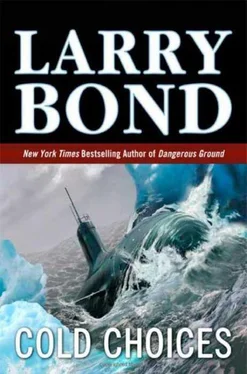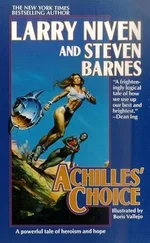“A remarkable fellow, this Rudel,” Kalinin observed nonchalantly, although his face radiated relief.
Petrov didn’t answer. He couldn’t. It required all his strength to simply hold back the tears brought on by this latest emotional roller coaster. But, for the first time since the failed rescue attempt, Petrov dared to hope.
11 October 2008
1645/4:45 PM
Severodvinsk
The recovery of the second supply vehicle from Seawolf was welcomed, but Petrov had forbidden any spectators. Unnecessary movement consumed more oxygen, producing even more carbon dioxide. There was enough poison in the air already; they didn’t need to make more simply to satisfy someone’s curiosity.
Captain-Lieutenant Rodionov checked the sight glass to make sure the torpedo tube had drained. Once satisfied that most of the water was in the tanks, he ordered his men to manually open the breech door. It still seemed very wrong to open a tube’s inner door and see the front of something that looked a lot like a torpedo staring back at you. After a quick inspection, Rodionov moved aside to make room for his torpedo specialists to prepare the vehicle for extraction. And this time they were ready. Hauling the first UUV, “Patty,” out of the tube had been a nightmare.
This time the tube had been prepared. Duct tape covered every obstruction, and having studied the vehicle’s construction, they knew which tools would be most effective for drawing it from the tube. Some would damage the exterior casing, but it was the last trip for it anyway, just as they would never bother removing the duct tape lining the tube. Severodvinsk would never move from her resting place, either.
As with all things in submarines, preparation made all the difference. Beaded with water, the dark green cylinder rolled smoothly onto the tray. The torpedomen moved it to an empty rack and began working on it like they’d done it their whole lives.
This time, the load was mostly V-64 air regeneration cassettes. “I count eighteen, Captain,” Rodionov reported. “They’ve also sent several batteries for our own lanterns and some boxes wrapped in plastic. There are also some more candy bars stuffed around the cassettes, but ours fit much better than those American curtains,” he said proudly.
“So Russian cassettes fit better in a jury-rigged American vehicle than the American equivalents.”
Rodionov shrugged. “Well, if you put it that way. ”
“Look at this!” One of the torpedomen held up a fat envelope, labeled “For the crew of Severodvinsk” in crisp Russian. He started to tear open the flap, but stopped himself, then handed it sheepishly to Petrov.
The captain didn’t wait to satisfy his curiosity. Inside was a thick sheaf of papers. The top sheet was a handwritten note from Admiral Borisov. He had taken command of the rescue operation, and was using every available resource to save them, etc., etc.
He’d read it later. The second sheet was from his father, in the city of Severodvinsk. Automatically, he started to read it, then stopped himself and turned to the next page. It was also for him, from his sister Nadya in Moscow. The next one was addressed to Kalinin, and then to Lyachin, and one to Mitrov, and so on. There was at least one letter for every surviving member of the crew!
“What are these?” interrupted one of the torpedomen holding two bags with numerous wrapped objects. “Is this food?”
Petrov took one of the bags, punched a hole in it, and pulled out one of the objects. Raising it up into the light, he read the label and chuckled. “No, I don’t think you’d want to eat this. I believe it’s poisonous.” He then opened the wrapper and removed a plastic tube about ten centimeters in length. Grasping the tube with both hands, he bent it until it made a crunching sound. He shook the tube vigorously, and it began to glow brightly. “Those clever Americans knew we would need some light to read our letters from home.”
Taking the top three pages, he thrust the rest of the papers and the glow sticks toward Rodionov. “Take these to the Starpom, and have him pass them out to the crew.”
“At once, Captain,” responded Rodionov eagerly.
Petrov only half-watched as the torpedomen collected the cassettes, batteries and food. There were two other unidentified wrapped boxes for Dr. Balanov. Medicines, thought Petrov as he shifted his position slightly. There were only two lanterns left in the torpedo bay, Rodionov having just taken the third one when he left. One was placed over the torpedomen as they worked on the American vehicle. The other provided general illumination, and Petrov positioned himself so the paper could catch as much of the light as possible.
Dear Aleksey,
The Navy says they will give this to you, but what should I say to a son who is trapped at the bottom of the sea? It is hard knowing you are in danger, but I try to remember that you are an officer in the Navy. This is part of your service.
The television is full of news about you and your crew. All of Russia, and many people around the world know about Severodvinsk. Everyone I know has asked me to tell you how sorry they are about the men you have lost, and that they are praying for your safe return.
Nadya says she will write to you as well. You know how she worries, but she is being very brave. The Navy should give her a medal.
All of your sub’s families have formed a “Wives and Mothers” group. They are taking care of the families of those who died, and pressing the Navy for information about your rescue. Olga Sadilenko is in charge, and the group is so successful that other navy families are joining, from other submarines and ships. They are thinking of making it a permanent organization.
In all my years of building submarines I never had to face what you are facing now. No matter what happens, I know you will always act for the good of your crew, the Navy and your country. I am proud of you, and I love you, my son.
Petrov finished the letter, then the one from Nadya, then his father’s letter again. It was still cold, and the air was still foul, but for the moment, it didn’t matter so much.
AS-34
Umansky nervously tapped the gauge that measured the battery discharge rate. It never helped, but he did it anyway. Just in case. This was the eighth dive for AS-34 on Severodvinsk , and the discharge rate increased almost every time. They weren’t drawing any more power, but the batteries were losing their charge more quickly. He’d tried to troubleshoot the problem back on Rudnitskiy, during charging cycles, but the increased loss was probably internal, inside each battery.
He checked his watch, then noted the rate, time, and remaining charge on the neatly columned pad. Detailed records might lead to understanding, and like every good submariner, Bakhorin wasn’t happy until he knew exactly how much trouble he was headed for.
Luckily, the trip down was short now, almost familiar. One of Halsfjord’s remotes had planted a sonar beacon near Severodvinsk’s bow. It was simple to home in on it, and they also didn’t need to use their active sonar. That meant more power saved.
This trip, the biggest drain would be the motors. AS-34 was carrying a cable, one of six that would be attached to Severodvinsk. Topside, they would be connected to two salvage tugs that were enroute from Severomorsk. Pamir and Altay were due to arrive early tomorrow, but it took time to attach the cables to the sub’s hull. For the time being, the upper end of each cable was fastened to a lighted buoy, which also served to mark Severodvinsk’s position.
Читать дальше












